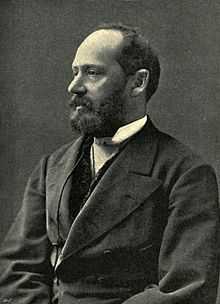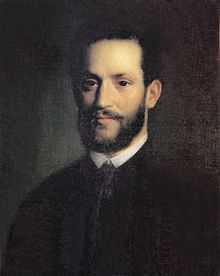Ármin Vámbéry
| Ármin Vámbéry | |
|---|---|
 | |
| Born |
19 March 1832 Szentgyörgy, Hungary, Austrian Empire (today Svätý Jur, Slovakia) |
| Died |
15 September 1913 (aged 81) Budapest, Austria-Hungary |
| Occupation | Turkolog, orientalist, traveller |
Ármin Vámbéry, also known as Arminius Vámbéry (19 March 1832 – 15 September 1913), was a Hungarian Turkolog and traveller.
Early life
Vámbéry was born as Hermann Bamberger or Ármin Bamberger in Szentgyörgy, Hungary, Austrian Empire (now Svätý Jur in Slovakia), into a poor Jewish family. According to Ernst Pawel, a biographer of Theodor Herzl, as well as Tom Reiss, a biographer of Kurban Said, Vámbéry's original last name was Wamberger rather than Bamberger. He was raised Jewish, but later became an atheist.[1] Vámbéry was 1 year old when his father died and the family moved to Dunaszerdahely (now Dunajská Streda in Slovakia). He attended the local school until the age of 12 and showed a remarkable aptitude for learning languages. He was forced to walk with crutches because of a congenital disorder and eventually had to leave school due to difficult financial circumstances. He worked briefly as a tailor's assistant, but after becoming tutor to the son of the village innkeeper, he was enabled by his friends to enter the "Untergymnasium" of Szentgyörgy.
By the age of sixteen, he had a good knowledge of Hungarian, Latin, French, and German. He was also rapidly acquiring English, the Scandinavian languages, Russian, Serbian, and naturally other Slavic languages.[2]
In 1846, he went to Pressburg (today Bratislava, Hungarian: Pozsony), where he remained three years. Later he studied at Vienna, Kecskemét, and Budapest.
Travels

Vámbéry was especially attracted by the literature and culture of the Ottoman Empire including Turkey. By the age of twenty, Vámbéry had learned enough Ottoman Turkish to enable him to go, through the assistance of Baron Joseph Eötvös, to Constantinople and establish himself as a private tutor of European languages. He became a tutor in the house of Huseyin Daim Pasha, and, under the influence of his friend and instructor, Ahmet Efendi, became a full Osmanli, serving as secretary to Fuat Pasha. [2] About this time he was elected a corresponding member of the Hungarian Academy of Sciences in recognition of his translations of Ottoman historians.
After spending about a year in Constantinople, he published a German-Turkish dictionary in 1858. Later, he also published various other linguistic works. He also learned some twenty other Turkish languages and dialects. Returning to Budapest in 1861, he received a stipend of a thousand florins from the academy, and in the autumn of the same year, disguised as a Sunni dervish, and under the name of Reshit Efendi, he set out from Constantinople. His route lay from Trebizond on the Black Sea to Tehran in Persia, where he joined a band of pilgrims returning from Mecca, spending several months with them traveling across Central Iran (Tabriz, Zanjan, and Kazvin). He then went to Shiraz, through Ispahan, and in June, 1863, he reached Khiva (Central Asia). Throughout this time, he succeeded in maintaining his disguise as "Reshit Efendi," so that upon his arrival at Khiva he managed to keep up appearances during interviews with the local khan. Together with his band of travelers, he then crossed Bokhara and arrived at Samarkand. Initially, he aroused the suspicions of the local ruler, who kept him in an audience for a full half-hour. Vámbéry managed to maintain his pretences, and left the audience laden with gifts. Upon leaving Samarkand, Vámbéry began making his way back to Constantinople, traveling by way of Herat. There he took leave of the band of dervishes and joined a caravan to Tehran, and from there, via Trebizond and Erzurum, to Constantinople, arriving there in March 1864.[2]

This was the first successful journey of its kind undertaken by a European; and since it was necessary to avoid suspicion, Vámbéry could not take even fragmentary notes, except by stealth. After a long and perilous journey he arrived back at Pest in May 1864. He went to London to arrange the English language publication of his book about the travels. "Travels in Central Asia" and its Hungarian counterpart "Közép-ázsiai utazás" were published in 1865. Thanks to his travels Vámbéry became an internationally renowned writer and celebrity. He became acquainted with members of British social elite. The Ambassador of Austria in London gave him a letter of recommendation to the Emperor, who received him in an audience and rewarded Vámbéry's international success by granting him professorship in the Royal University of Pest.[3]
Vámbéry was one of the Jewish Orientalists, like Kurban Said (Lev Nussimbaum), who assumed Muslim identities and wrote about Muslim life. He converted four times. He was a double agent and a double dealer. He was close to the Ottoman sultans. In 1900-1901 he promised Theodor Herzl to arrange an audience for him with Ottoman Sultan Abdülhamit II, but his real goal was to obtain money from Herzl, and he did not arrange the meeting. The Ottomans were merely using Herzl as a playing card in their negotiations with Maurice Rouvier of France on the consolidation of their debt.
Vámbéry became known also as a publicist, zealously defending English policy in the East as against that of the Russians. He was widely celebrated at his 70th birthday in March 1902, receiving greetings from academic institutions all over Europe. The British King Edward VII appointed him an Honorary Commander of the Royal Victorian Order, his house order,[4] followed by a letter where Vámbéry was appreciated as "so good and constant a friend to England".[5] In 2005 the National Archives at Kew, Surrey, made files accessible to the public, and it was revealed that Vámbéry had been employed by the British Foreign Office as an agent and spy whose task it was to combat Russian attempts at gaining ground in Central Asia and threatening the British position on the Indian sub-continent.
He advocated the theory of close Turkic-Hungarian linguistic and ethnic relationship, and his publications on the subject provoked a harsh scientific and public debate in Hungary, remembered as the "Ugric-Turk War". Vámbéry argued that the large number of similarities between Turkic languages and Hungarian pointed to a shared origin of these languages and peoples in Northern Asia. In his opinion Hungarian is a contact language, more precisely a mixed language, and a fruit of the intermingling of early Hungarians with Turkic peoples; as a result of this merger, the Hungarian language got a unique, distinctly dual (Ugric AND Turkic) character. His theory was opposed by followers of the Finno-Ugric theory of the origins of Hungarian, who gradually triumphed in Hungary but not in Turkey. In Turkey, Hungarian and Turkish are still considered as two branches of the same language family, the Ural–Altaic.
Vámbéry knew Bram Stoker and is believed by some biographers to have acted as his consultant on Transylvanian culture. The character of Professor Van Helsing in Stoker's novel, Dracula, is sometimes said to be based on Vámbéry, though there is no real evidence of this supposition.[6] In the novel (chapter 23) the professor refers to his "friend Arminius, of Buda-Pesth University".
There is a vampire hunter character in the webcomic Sluggy Freelance named Arminius Vambrey possibly based on this Armin Vambery and his candidacy as inspiration for Abraham Van Helsing.
His son, Rusztem Vambery, briefly served as Hungary's ambassador to the United States after World War II.
Publications
- "Deutsch-Türkisches Taschenwörterbuch" (Constantinople, 1858) [German-Turkish Pocket Dictionary]
- "Abuska," a Turkish-Chagatai dictionary (Budapest, 1861)
- "Reise in Mittelasien" (Leipzig, 1865, 2d ed. 1873) [Travel in Middle Asia]
- "Cagataische Sprachstudien" (ib. 1867) [Chagatai Language Studies]
- "Meine Wanderungen und Erlebnisse in Persien" (ib. 1867) - Wanderings and Adventures in Persia [My Wanderings and Experiences in Persia]
- "Skizzen aus Mittelasien" (ib. 1868) - Sketches of Central Asia
- "Uigurische Sprachmonumente und das Kudatku-Bilik" (Innsbruck, 1870)
- "Uigurisch-Türkische Wortvergleichungen" (Budapest, 1870)
- "Geschichte Bocharas" (2 vols., Stuttgart, 1872) - History of Bokhara (1873)
- "Der Islam im Neunzehnten Jahrhundert" (Leipzig, 1875) [Islam in the Nineteenth Century]
- "Sittenbilder aus dem Morgenlande" (Berlin, 1876) - Manners in Oriental Countries
- "Etymologisches Wörterbuch der Turkotatarischen Sprachen" (Leipzig, 1878) [Etymological Dictionary of the Turko-Tatar Languages]
- "Die Primitive Cultur des Turkotatarischen Volkes" (ib. 1879) - Primitive Civilization of the Turko-Tatar People
- "Der Ursprung der Magyaren" (ib. 1882) - Origin of the Magyars
- "Das Türkenvolk" (ib. 1885)- The Turkish People
- "Die Scheïbaniade, ein Oezbegisches Heldengedicht", text and translation (Budapest, 1885)
- "Story of Hungary" (London, 1887)
- "A Magyarság Keletkezése és Gyarapodása" (Budapest, 1895)
- "Travels and Adventures of the Turkish Admiral Sidi Ali Reis in India, Afghanistan, Central Asia, and Persia During the Years 1553-1556", a translation from the Turkish (ib. 1899)
- "Alt-Osmanische Sprachstudien" (Leyden, 1901) [Old-Ottoman (Turkish) Language Studies]
- "?" - Western Culture in Eastern Lands (1906)
On political subjects, Vámbéry wrote:
- "Russlands Machtstellung in Asien" (Leipzig, 1871) [Russia's Power Position in Asia]
- "Zentralasien und die Englisch-Russische Grenzfrage" (ib. 1873) [Central Asia and the English-Russian Border Question]
- "The Coming Struggle for India" (London, 1885)
He wrote his autobiography under the titles "Arminius Vámbéry, His Life and Adventures" (ib. 1883) and "Struggles of My Life" (ib. 1904).
Many of his works have been translated into other languages, especially French. He also published numerous articles and books, mostly in German and Hungarian. His travels have been translated into many languages, and his Autobiography was written in English.
"Meine Wanderungen und Erlebnisse in Persien" has been translated into Persian, by the famous Iranian film director Khosrow Sinai.
References
- ↑ Germany, Turkey, and Zionism 1897-1918. Transaction Publishers. 1997. p. 97. ISBN 9781412824569.
When Herzl met him on 16 June 1900 he was seventy years old, not clear about his own identity, whether a Turk or an Englishman, but his study of religions had made him an atheist.
- ↑ 2.0 2.1 2.2 Chisholm 1911.
- ↑ Vámbéry Ármin: Küzdelmeim. 1905.http://mek.oszk.hu/03900/03975/03975.pdf
- ↑ The London Gazette: no. 27430. p. 2933. 2 May 1902.
- ↑ "Court Circular" The Times (London). Saturday, 22 March 1902. (36722), p. 12.
- ↑ Top 10 Famous Mysterious Monsters
- Attribution
-
 This article incorporates text from a publication now in the public domain: Chisholm, Hugh, ed. (1911). "Vámbéry, Ármin". Encyclopædia Britannica (11th ed.). Cambridge University Press.
This article incorporates text from a publication now in the public domain: Chisholm, Hugh, ed. (1911). "Vámbéry, Ármin". Encyclopædia Britannica (11th ed.). Cambridge University Press. -
 This article incorporates text from a publication now in the public domain: "Vámbéry, Arminius". Jewish Encyclopedia. 1901–1906.
This article incorporates text from a publication now in the public domain: "Vámbéry, Arminius". Jewish Encyclopedia. 1901–1906.
Sources
- Herzl, King of the Jews: A Psychoanalytic Biography of Theodor Herzl, by Avner Falk (1993), pp. 395ff. has a detailed discussion of Vámbéry's biography and of his relations with Herzl.
External links
| Wikimedia Commons has media related to Ármin Vámbéry. |
- Works by Arminius Vámbéry at Project Gutenberg
- Works by or about Ármin Vámbéry at Internet Archive
- Jewish Discovery of Islam by Martin Kramer, includes discussion of Vámbéry.
- Books of Ármin Vámbéry in the Hungarian Electronic Library
|